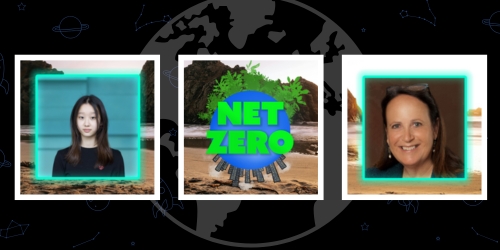This month, audiences can screen Net Zero Speaks with Felicia Marcus on Planet Classroom. This film is curated by the Protect Our Planet Movement and Planet Classroom.
In Net Zero Speaks, Felicia Marcus—renowned climate policy leader and former Chair of California’s State Water Board—joins climate activist Cherry Sung to discuss water resilience, climate action, and equity. Marcus has led efforts during historic droughts, championing nature-based solutions like wetlands restoration and beaver reintroduction. This episode, produced by Jack DeWitt, explores how innovative water management, strategic public-private funding, and community engagement can drive climate solutions. A must-watch for anyone passionate about sustainability, environmental justice, and bold policy action.
The Global Search for Education is pleased to welcome Cherry Sung.
Cherry, why did you decide to interview Felicia Marcus?
Felicia Marcus is a pioneering voice in water management and climate resilience. Her leadership in tackling California’s historic droughts, advocating for equitable water access, and implementing nature-based solutions is inspiring. What sets her apart is her ability to bridge government, nonprofit, and legal expertise to create tangible change. She isn’t just shaping policy—she’s actively working to implement solutions that benefit both ecosystems and communities. Her commitment to climate equity and long-term sustainability made her the perfect guest for this conversation.
What surprised you most about your interview?
I was most surprised by California’s large-scale adoption of nature-based solutions. I had never realized the extent to which strategies like terrace wetlands and beaver reintroduction were being used to combat environmental challenges. Another unexpected insight was the complexity of climate finance—funding solutions aren’t just about political will. They require innovative partnerships, a long-term vision, and ensuring that resources reach the communities that need them most.
What are the three main takeaways for the Net Zero audience from your interview?
- Nature-based solutions are essential for climate resilience. From stormwater capture in Los Angeles to terrace wetlands in San Francisco Bay, natural solutions are proving to be effective ways to enhance water security, protect biodiversity, and mitigate climate impacts.
- Financing and policy alignment are key to sustainability. State-led initiatives like California’s cap-and-trade program and Justice40 ensure that climate funding supports underserved communities. Successful long-term climate solutions depend on public-private partnerships and innovative financing models.
- Equity must be at the center of climate action. Engaging indigenous and marginalized communities in climate decisions leads to more just and effective solutions. Climate resilience isn’t just about technology—it’s about ensuring policies prioritize those most affected by environmental change.
Thank you, Cherry!
C. M. Rubin and Cherry Sung
Don’t Miss Net Zero Speaks with Felicia Marcus, now streaming on the Planet Classroom Network. This film is curated by the Protect Our Planet Movement and Planet Classroom.







Recent Comments